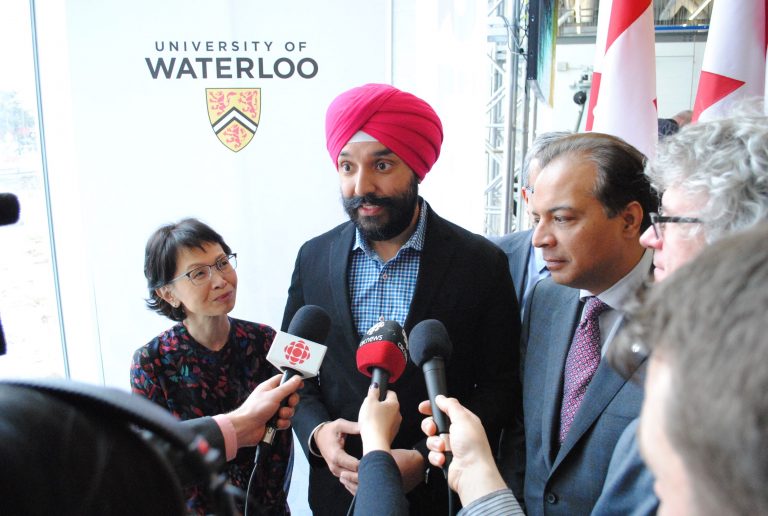Building on the strengths of its world-renowned co-op programs and partnerships with industry, the University of Waterloo on Friday announced the launch of the Waterloo Artificial Intelligence Institute, aiming to provide a platform for startups and established companies alike to leverage the university’s AI expertise and enhance their own AI capabilities.
“It’s going to work like a hub that is going to be a bridge between industrial partners and academics, faculty members, researchers, students, who are doing research at the level of operational and applied artificial intelligence,” said institute co-director Fakhri Karray, a professor of electrical and computer engineering at UW.
Speaking at the university’s Sedra Student Design Centre, site of the announcement, Karray said the university would offer what were in effect “reverse co-ops” where, instead of students heading out for work terms with companies doing business in their fields, employees and engineers already working in industry would come to the university and take part in courses and workshops designed to help them solve problems faced by their companies. The courses, he said, would in effect be “workshops, summer schools and winter schools.
“We would like to map the expertise of research members at the university level along with companies that would like to have solutions utilizing artificial intelligence and machine learning,” said Karray. “So, the institute would be like a broker, [providing] this type of linkage between the two parties.
“This is one of our main goals.”
Karray will be joined in his role as a co-director of the institute with UW Professor of Computer Science Peter van Beek.

Federal Minister of Innovation, Science and Economic Development Navdeep Bains speaks with
reporters at the University of Waterloo on Friday. (Communitech photo: Craig Daniels)
Also on hand was federal Minister of Innovation, Science and Economic Development, Navdeep Bains, who took part in a roundtable discussion after the formal announcement.
“We want more collaboration,” said Bains afterward. “We want to see people working together. The economy is doing well. How do we maintain that momentum? What do we need to invest in? Where are the opportunities?
“Artificial intelligence creates opportunities in Ontario and Canada.”
Bains said it’s estimated that artificial intelligence will contribute up to $15.7 trillion per year to the global economy by 2030.
“If properly leveraged, AI will promote innovation, grow the economy and create thousands of middle-class jobs.”
Taking part with Bains at the roundtable was moderator Pearl Sullivan, the UW Dean of Engineering; Kerstin Dautenhahn, recently named as one of the university’s Canada 150 research chairs; UW Professor Kate Larson, who specializes in artificial intelligence; Donna Litt, co-founder and Vice-President of Operations and Marketing at Waterloo firm Kiite; and Kurtis McBride, CEO of Kitchener’s Miovision, which uses AI in its products designed for the Internet of Things. Miovision is one of the institute’s corporate sponsors.
“A decade out, every single business on the face of the earth will use AI in some capacity,” said McBride.
“A lot of the universities in Canada are focussed on pushing the envelope in AI – high computational applications.
“Waterloo is has a ton of unique assets, but one of the [additional] assets that we have is we look at the world through a very practical and applied lens.
“This institute really helps on the commercialization side, to be able to take the stuff that’s being developed by the theorists and move it downstream to the commercial applications.”
Karray said that the nature of the work that will be done at the institute will differentiate it from the Vector Institute, which opened last year in Toronto and which also specializes in AI.
“We complement each other,” said Karray. “The Vector Institute has a lot of expertise in the field of machine learning and deep learning. The UW AI institute Is going to be generic in terms of AI. It’s going to encompass not only machine learning but going to encompass expert systems, game theory, multiplication systems, automotive. All of these things.”
Litt said the addition of the institute will further cement Waterloo Region as a go-to destination for talent and companies looking to locate here.
“This announcement is exciting for us because it tells the world that Waterloo Region is a place where people are committed to building a better and more inclusive future for everyone.
“This initiative will help keep us accountable to our community stakeholders and will attract the diversity of talent we need – leaders in the sciences and arts – to solve the technology problems we face in developing AI, in the right ways.”
In addition to Miovision, other sponsors of the UWaterloo Institute include: General Motors Canada, Huawei Technologies, Loblaw Companies, Shopify, Borealis AI, Magna International, NexJ Systems and Scribendi.

